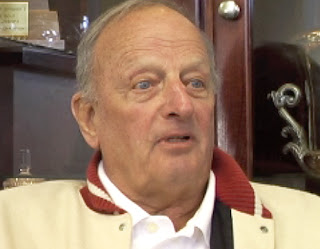
Stanford's Maverick McNealy, winner of 9 tournaments in the last two years is featured in this article by Golf Channel. Maverick is on his way to re-writing the Stanford record book --- http://stanfordmensgolf.com/scoringStats1993on.htm --- as he has broken scoring records and sits third on the all-time wins list behind only Tiger Woods and Patrick Rodgers who each won 11 events.
After winning nine times in 14 months, earning NCAA Player of the Year honors, playing a pair of PGA Tour events, going deep in the U.S. Amateur, representing the United States at the Walker Cup and competing in the fall while handling a full course load for his management science and engineering major, Maverick McNealy is ready to do something he hasn’t done since high school.
He is putting the clubs away.
Not because he’s burned out. Not because he doesn’t want to play golf.
“I just need the rest right now,” he said.
McNealy is stepping back only for eight or nine days, nothing crazy, but it’s a well-deserved reprieve for the Stanford junior who has emerged as America’s most intriguing prospect in years.
Fatigued or not, his game has shown no signs of slowing down. He finished the fall season Nov. 4 with a victory at the Gifford Collegiate, his third in four starts.
“That leaves a pretty good taste in my mouth that I can enjoy for the next few days,” he said.
The 20-year-old burst onto the scene last fall, just a few months removed from being Stanford’s No. 5 man on a team that reached the NCAA semifinals. He wound up winning an NCAA-best six times, posting the second-lowest scoring average in history (69.05) and sweeping all of the postseason awards.
Then came a busy summer, when he made the cut in both PGA Tour events he played, advanced to the Round of 16 at the U.S. Amateur (losing to eventual champion Bryson DeChambeau) and spent a week overseas at the Walker Cup. Upon returning to the States, he flew directly to Chicago and had one day to prepare for the Cardinal’s season opener, at Olympia Fields. All he did was open with rounds of 67-65 and win by three.
“I’ve walked a fine line of not being rested and not being sharp,” he said. “It feels like I’ve been playing catch-up.”
Yet it hasn’t affected his game, at least not from a results standpoint.
McNealy’s worst finish this fall? Fifth. He shared top honors at the U.S. Collegiate, the strongest field of the fall. And last week, at the Gifford, he erased a five-shot deficit in the final round with a closing 67. On the last two holes, he rolled in 70 feet worth of putts to steal his third victory of the fall, the most of any player in NCAA Division I. Again.
After the round, while eating lunch with his teammates, he finally crashed.
“I felt like I was going to face-plant in my food,” he said.
How McNealy has been able to summon the goods while teetering on the edge of burnout can be traced back to smart preparation and an extensive journal that documents every practice session, round, tournament and year.
One entry in particular stands out, from his first fall tournament last year.
In the lead for the first time in his career, McNealy realized he had 2 ½ hours to kill before his final-round tee time. He can eat only so many breakfasts, and hit so many balls, so he developed a stretching routine that he has used ever since. For a half hour, in the hotel room or in the locker room, McNealy throws on his headphones and listens to music that slows down his internal tempo.
During that quiet time, he puts the next few hours in perspective: What do I need to do today? What does this round mean to me? Who am I playing for? The answer to the last question, always, is his teammates.
“It feels like everything slows down in my mind,” he said. “Physically, it feels like I’m getting ready for somebody to punch me in the stomach. There’s a tense feeling. And then there’s an intense focus on the target.”
On the course, he strives to reach a performance state, a zone where he doesn’t even remember making swings; all he picks up is the ball in mid-flight or mid-roll. It can’t be re-created in casual rounds with his parents or three brothers, Dakota, Colt and Scout. It’s found only when the pressure is at its most intense.






